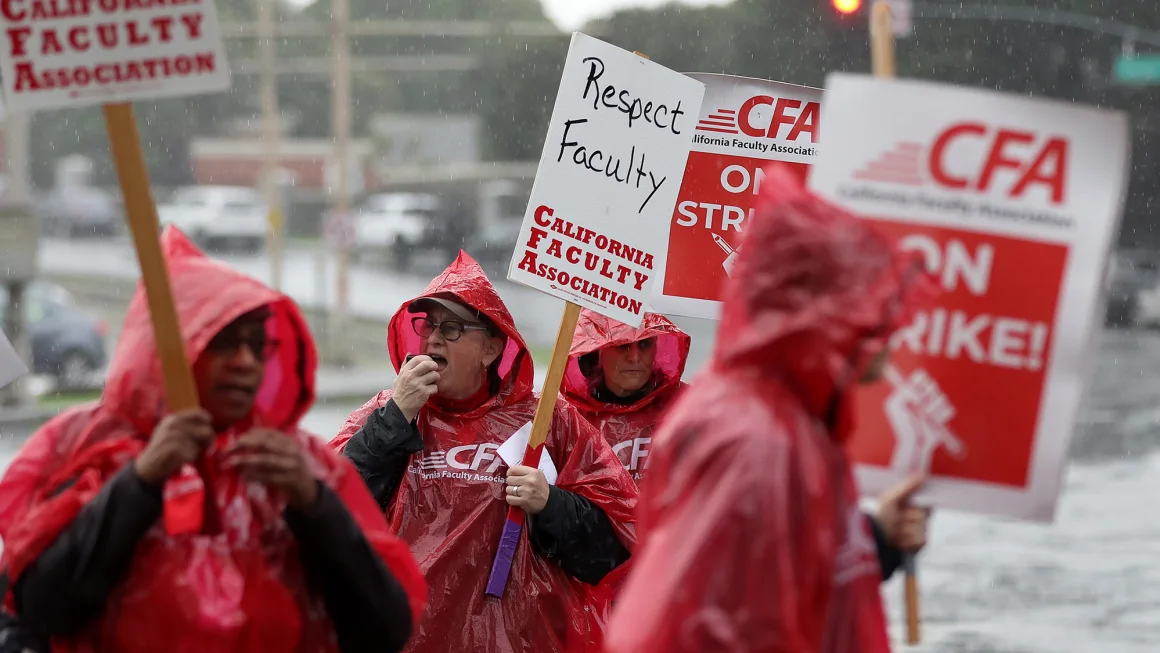By Samantha Delouya
Thousands of faculty members at California State University, the largest university system in the US, walked off the job on Monday, the first day of spring semester classes for much for the university system’s 450,000 students.
The striking staff are part of the California Faculty Association union, which represents 29,000 members, including professors, lecturers, librarians, counselors, and coaches, across 23 campuses.
Cal State’s faculty joins a growing number of workers who have walked off the job as strikes grow in popularity in the US, and especially in California.
The union says its members are seeking “wages that keep pace with the cost of living and set a livable minimum standard for our lowest paid faculty.”
n addition to pay raises, CFA, which describes itself as “an anti-racism and social justice union,” is proposing more manageable workloads, more mental health services for students and expanded paid parental leave, among other demands.
In a statement, Cal State said it “remains committed to supporting our students and entering into labor agreements that do not result in cuts to the academic and student supportive programs that make the CSU the most diverse and transformative university system in the nation.”
The strike is temporary and will end on January 26, according to the union. There are no bargaining sessions currently scheduled, according to a CFA spokesperson.
What the striking faculty are demanding
The union has been bargaining with Cal State since May, but agreements have not been made on pay increases.
The union is specifically seeking a 12% pay raise, along with a base salary increase to $64,360 for the lowest-paid full-time faculty.
During a Monday rally at Cal State University Long Beach, Elaine Villanueva Bernal a lecturer in the department of chemistry at the university said her salary has not kept up with the cost of living and inflation in her city.
“My take home base salary is just $59,000, which is well below the living wage in Los Angeles County,” she said.
Villanueva Bernal said one of her children attends a Cal State school, one of two public university systems in California.
“Our family cannot bear the impact of a 34% tuition increase over the next several years,” she said. In a statement, Cal State said the CFA’s demand for a 12% raise, along with other economic demands, are “financially unrealistic.”
Their request far surpasses the state funding increase that the CSU received in last year’s state budget ($227 million) and is more than the entire budget of Cal Poly Pomona ($369 million),” Cal State said.
The union has been bargaining with Cal State since May, and the university system has offered a 5% raise each year over three years.
However, CFA has argued that Cal State can afford their proposals.
“We are fighting against management’s self-defeating austerity policies that serve to shift funding away from classrooms, labs, libraries, athletics, and counseling centers,” the union said.
More workers are choosing to strike
The Cal State faculty strike reflects a larger trend: a growing movement of US workers walking off the job.
From the United Auto Workers to Hollywood writers, nurses, Starbucks baristas and pharmacy staff, thousands of workers have gone on strike recently to demand higher pay and better working conditions.
There have been more than 400 major strikes in the past year alone, with Southern California being a particular hotbed for labor activity, according to a Cornell University school of Industrial and Labor Relations database.
It is less common for university professors to go on strike, though not unprecedented. In November 2022, 48,000 academic employees across the University of California system, California’s other public university system, walked off the job, demanding higher pay that matched housing costs, transportation subsidies and other benefits.
That strike involved graduate student researchers, instructors and others who provide academic support across the University of California’s ten campuses. It lasted six weeks but ended when both sides agreed on a labor contract.
On Monday, Cal State said that individual classes, athletic practice, and counseling services may be canceled during the strike, which is at the start of most schools’ spring semester. However, Cal State is not formally canceling classes and has said that students should not assume classes are automatically canceled due to the strike.

